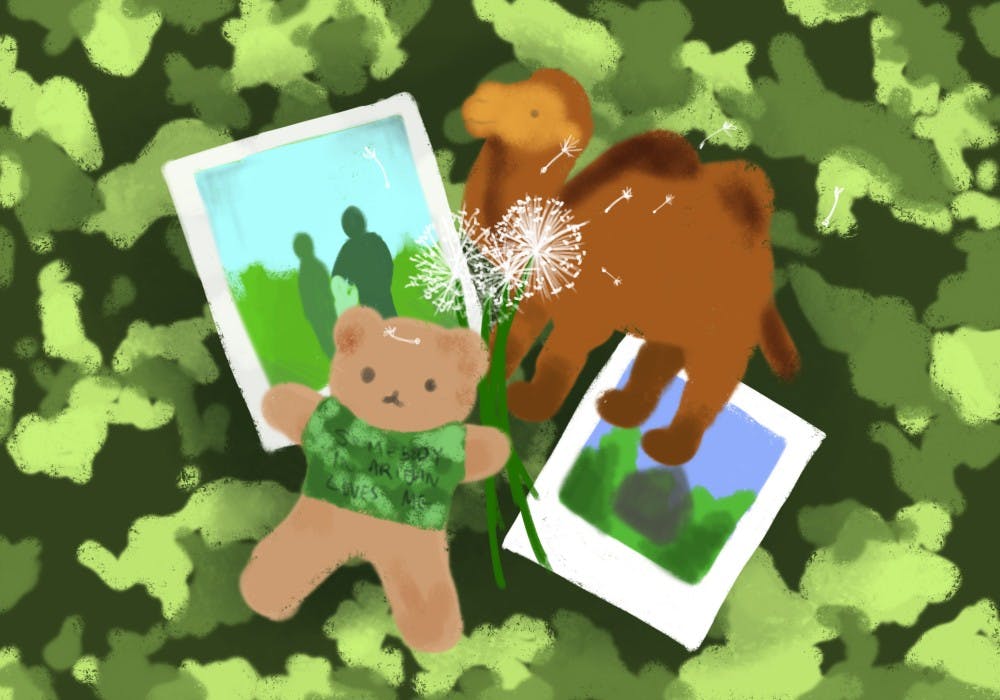“Your dad is a bad dad,” my friend Annabelle informs me, with the world–weary confidence she gains from being a whole three weeks older.
“My dad isn’t a bad dad!” I respond indignantly, with all of the grouchiness and intimidation a short, chubby, violently blonde four–year–old can muster while wearing light–up Skechers and a stained T–shirt.
“No, silly, I said he’s in Baghdad,” she says, stopping on the stairs above me. Not wanting to admit I have no idea what (or who) Baghdad is, I continue stubbornly with the one thing I know for sure.
“My dad is not a bad dad!”
What I didn’t realize was that my father was a US Army soldier, who was deployed to Bosnia, Kuwait, and Iraq over several years before I was born and during my childhood.
While other kids had stuffed teddy bears, I had a pack of stuffed camels (including one particularly memorable camel that spoke only in Arabic and had glowing red eyes) from all of the places he was deployed. I also had a sandy colored bear in camo with a shirt emblazoned with: Somebody in Arifjan Loves Me.
A kid can’t understand the true meaning of warfare. War is something in books and movies, for hobbits and elves, muscled superheroes and clean pressed, sharp jawed WWII heroes. The idea that my dad was in “Baghdad” meant the same as my mother travelling on a business trip, albeit a much longer one. I had no idea of the danger—or that he could die during combat.
My mother took over the role of both parents, raising me essentially on her own for my first few years. We didn’t live on a military base, so she didn’t have the support network that most military families have from other military wives whose husbands are also deployed. She was on her own while raising a kid, although she did have experience with tough situations. As one of the first women at the US Naval Academy, who later became a Marine, and then entered the male–dominated world of defense contracting, she was used to relying on her own strength rather than outside support networks.
Because of the security and reliability that she gave me, I grew up a normal, well–adjusted, and precocious kid. I played soccer, learned Taekwondo, rose up the ranks of Girl Scouts, all while making friends at my local school. On weekends, we would make care packages for my dad, which included my letters and drawings, cookies, and bootleg action movie DVDs that he would share with the Iraqi men deployed alongside him (action movies don’t need a common language). When I was very young, I would try and hide myself inside the box, hoping to send myself as part of his care package.
Every night, my mother would read My Daddy is a Soldier alongside Goodnight Moon because I liked routine. In a military house, few things are ever assured, and this nightly ritual added much needed stability to an unstable scenario.
As a military kid, I learned a lot of essential skills very early: how to meet new people (especially adults), becoming acquainted quickly, how to be alone and entertain myself, and most importantly, how to adapt to unfamiliar scenarios without complaint. My father was a reservist, so his deployments overseas came with little notice. I learned through my tears that while I couldn’t control the situation, I could control my reaction to it.
The official flower of the military child is the dandelion—for a reason. It can grow anywhere, adapt to any situation, and most importantly, is almost impossible to destroy. Life may bluster and roar, but I can always plant new roots, make new friends, and find new adventures in any location. Today, my “good dad” is home, and I have finally learned what (and where) Baghdad is.
My Dad was Deployed in Baghdad. For a While I Didn't Know What that Meant.
"The official flower of the military child is the dandelion—for a reason. It can grow anywhere, adapt to any situation, and most importantly, is almost impossible to destroy."

34th Street is an independent, student-run arts & culture magazine. Please consider making a donation to support the coverage that shapes the University. Your generosity ensures a future of strong journalism at Penn.
Donate





